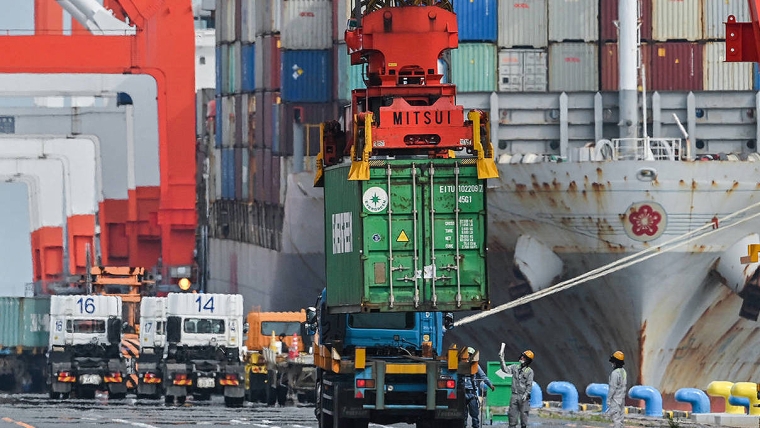
As US tariffs begin to reshape global trade flows, many countries are worried that a tsunami of discounted Chinese goods, originally destined for America, will hit their shores. To keep them out, especially as recessionary pressures mount, some may be inclined to impose their own tariffs on Chinese imports. In that case, China would be cut off entirely from international trade, delivering an unexpected victory for US President Donald Trump, who would undoubtedly claim credit for this new Great Wall.
To avert this scenario, China must pursue short-term policies that align with its long-term goal of building a global governance architecture for a multipolar world. China harbors no illusions that it will be the twenty-first century’s hegemon. India will inevitably become a superpower by mid-century. Europe might join their ranks, too, as Trump’s might-is-right worldview seems poised to accelerate and deepen European integration.
The current Sino-American standoff seemingly reflects a shared understanding that avoiding the Thucydides Trap – when tensions between an incumbent hegemon and a rising power lead to conflict – will require an eventual agreement on respective spheres of influence. Both sides’ defensive efforts to expand their global reach have devolved into a crude form of imperialism. Trump has designs on Canada, Greenland, Panama, and Gaza, while China’s territorial claims in the South China Sea have brought its maritime border to the doorstep of several Southeast Asian countries.
But it remains to be seen how the trade war will factor into this contest. The tariffs that the US and China imposed against one another have effectively decoupled their trade. Will countries hit by his “reciprocal” tariffs be cowed into joining the US sphere of influence as part of bilateral trade deals?
The answer is no, so long as China respects its trade partners’ right to befriend all superpowers. In such a scenario, the benefits of trading with China remain too large to forgo. But to take advantage of these benefits and maintain their autonomy, middle powers will need to pursue multilateral cooperation.
As a first step, middle powers must convince China that it is in its long-term interest to stop the potential fire sale of goods intended for the US market, which means voluntary export restraints. But the Chinese government must also focus on boosting domestic consumption by lowering income and value-added taxes, expanding social-welfare programs (especially for health care, childcare, and pensions), and easing the hukou household registration system – which regulates access to social services – in major coastal cities. Moreover, China can generate higher demand for services by attracting more foreign tourists and students, and by incentivizing Chinese tourists to travel domestically.
To cushion the adjustment pains and lower the budget deficit in the medium term, China should double down on supply-side structural reforms and overhaul the financial sector, which would unleash new productive forces. For example, if market-driven medium-size private banks were permitted to emerge, they could nurture the employment-intensive small and medium-size enterprises that large state-owned banks have traditionally discriminated against. Loosening capital controls would also support the renminbi’s internationalization to the status of the dollar and Shanghai’s emergence as a global financial center on par with London and New York.
The escalating US-China trade war, and the competing technological standards that stem from deeper geopolitical fragmentation, will cause substantial damage to middle powers. Being forced into a sphere of influence would erode these countries’ sovereignty and limit their export markets. To avoid becoming pawns in a proxy war, middle powers should form a union of independent buffer states based on the same principles as the United Nations and the World Trade Organization.
Members of the Association of Southeast Asian Nations (ASEAN), together with Japan and South Korea, should propose an Atlantic-Pacific Sustainability Pact to the European Union and the United Kingdom. Practicing open regionalism, APSP would have three main tasks. The first would be to create a free-trade area that is open to all countries, with an eye to building the biggest possible integrated market. ASEAN members, Japan, and South Korea could then merge the main Asia-Pacific trade agreements under the economic umbrella of APSP.
The second task would be to institute a nonpartisan peace caucus in the UN and other global and regional forums to prevent tensions between the US and China (as well as Russia) from impeding international coordination on shared global problems such as climate change and pandemics. Lastly, APSP would do well to establish a development agency whereby richer members could provide technical and financial support to poorer members’ efforts to achieve net-zero greenhouse-gas emissions, protect their biodiversity, and accelerate economic growth. This would offset the assistance that competing superpowers use to influence poor countries.
As ASEAN economies catch up with those in the Global North, their combined GDP could equal that of the EU and the UK by 2045. In such a scenario, APSP’s economic might would be so great that the US and China would have to join the trade partnership or else risk defeat from self-isolation.
Cooperative multilateralism is middle powers’ best hope for mitigating the fallout from the Sino-American cold war; and it might even eventually crowd out this conflict. At a minimum, cooperative multilateralism by middle powers would ensure peaceful global governance as the international order transitions from a unipolar world to a multipolar world.
Woo Thye Wing, Professor Emeritus of Economics at the University of California, Davis, is University Chair Professor at the China Economic Research Institute at Liaoning University, a visiting professor at the University of Malaya, and a research professor at Sunway University. Copyright: Project Syndicate, 2025, and published here with permission.

We welcome your comments below. If you are not already registered, please register to comment
Remember we welcome robust, respectful and insightful debate. We don't welcome abusive or defamatory comments and will de-register those repeatedly making such comments. Our current comment policy is here.